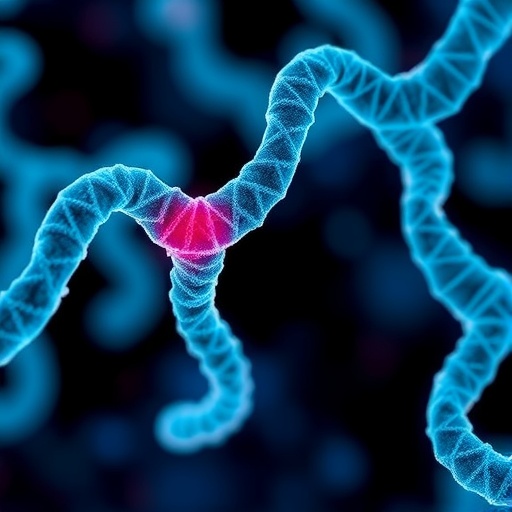In a groundbreaking study published in Reproductive Sciences, researchers Liu and Zhao unveil significant insights into the genetic underpinnings of endometrial, ovarian, and cervical cancers. The study utilizes a multilevel transcriptomic association analysis, offering a fresh perspective on the crucial genes that may be driving these prevalent malignancies. By employing sophisticated bioinformatics methods, the researchers identified an array of key genetic markers that could play pivotal roles in the development and progression of these types of cancers.
The traditional view of cancer has frequently focused on a select few genes; however, Liu and Zhao’s research indicates that the molecular landscape is much more complex. The approach taken in their study allows for the integration of various types of transcriptomic data, creating a more comprehensive map of genetic interactions and pathways. This expanded viewpoint not only challenges the conventional understanding but also opens new avenues for targeted therapies and personalized medicine.
One of the staggering revelations from the study is the identification of gene networks that are commonly activated across the three types of cancers. This commonality suggests that there may be shared biological pathways that contribute to cancer pathogenesis. For example, the findings highlight several oncogenes and tumor suppressor genes that are intertwined, presenting new opportunities for interventions that could potentially halt the progression of these cancers at a molecular level.
Furthermore, the analysis demonstrated significant interactions between specific transcripts, indicating that the relationship between gene expression and cancer progression is far more intricate than previously thought. The interplay between these genes could offer insights into how cancer cells adapt and thrive within the hostile environment of the tumor microenvironment, suggesting potential targets for therapy that might disrupt these adaptive mechanisms.
In exploring potential mechanisms, Liu and Zhao also investigated the role of epigenetic modifications in cancer development. Epigenetic changes can influence gene expression without altering the underlying DNA sequence, thus providing another layer of complexity. Their analysis revealed that certain epigenetic markers are significantly correlated with the expression of key genes in endometrial, ovarian, and cervical cancers, illustrating how environmental factors can potentially activate or silence genes involved in these malignancies.
Moreover, the study sheds light on the role of microRNAs in regulating the gene networks identified. MicroRNAs are small, non-coding RNA molecules that can modulate gene expression post-transcriptionally. The findings suggest that specific microRNAs may provide a regulatory mechanism that contributes to the malignancy of cancer cells by affecting the stability and translation of mRNA transcripts responsible for tumor progression.
The implications of Liu and Zhao’s findings extend beyond merely understanding cancer biology. The discovery of these gene interactions and regulatory networks could facilitate the development of biomarkers for early detection. Early-stage cancers are often asymptomatic; hence, identifying specific genetic alterations may allow for timely screening and intervention, ultimately improving patient outcomes in a landscape heavily marked by late diagnoses.
Additionally, this research could hasten the discovery of novel therapeutic targets. By understanding the networks and pathways involved, scientists can design drugs that more effectively disrupt these processes. Targeted therapy, which focuses on specific genetic or molecular markers present in tumors, shows promise in enhancing treatment efficacy while minimizing side effects.
As this research enters peer discussion, excitement abounds regarding potential future collaborations. The synergy between computational biologists, oncologists, and geneticists will likely accelerate the translation of these findings from bench to bedside, making integrated approaches to cancer treatment more accessible and efficient.
Patient involvement in cancer research is also critically highlighted. The study emphasizes the importance of understanding patient-specific genetic profiles, advocating for personalized healthcare approaches. By tailoring therapies based on individual genetic makeup and cancer type, healthcare providers can increase the likelihood of treatment success and improve quality of life for patients battling these aggressive diseases.
Despite the promising findings, Liu and Zhao assert that further research is necessary to validate these initial insights. Longitudinal studies that track gene expression changes throughout cancer progression will be essential in confirming the roles these genes play over time, emphasizing the dynamic nature of cancer biology.
In conclusion, the research led by Liu and Zhao represents a pivotal advancement in the understanding of endometrial, ovarian, and cervical cancers. By weaving together intricate networks of gene interactions and regulatory mechanisms, the new insights obtained could revolutionize how these cancers are diagnosed and treated. As the scientific community examines and builds upon this work, it may usher in a new era of precision oncology, where treatment plans are not just effective but profoundly personalized.
This comprehensive analysis not only augments the existing body of knowledge surrounding gynecological cancers but also underscores the importance of genomic studies in paving the way toward innovative treatment modalities. As the field advances, it is crucial to maintain a sharp focus on how these findings can be rapidly translated into clinical practice, maximizing their potential impact on public health.
Subject of Research: Genetic underpinnings of endometrial, ovarian, and cervical cancers.
Article Title: Multilevel Transcriptomic Association Analysis Reveals Key Genes and Potential Mechanisms in Endometrial, Ovarian, and Cervical Cancers.
Article References:
Liu, L., Zhao, X. Multilevel Transcriptomic Association Analysis Reveals Key Genes and Potential Mechanisms in Endometrial, Ovarian, and Cervical Cancers.
Reprod. Sci. (2025). https://doi.org/10.1007/s43032-025-02010-6
Image Credits: AI Generated
DOI: https://doi.org/10.1007/s43032-025-02010-6
Keywords: Transcriptomic analysis, endometrial cancer, ovarian cancer, cervical cancer, personalized medicine, gene networks, microRNAs, epigenetics, targeted therapy.




